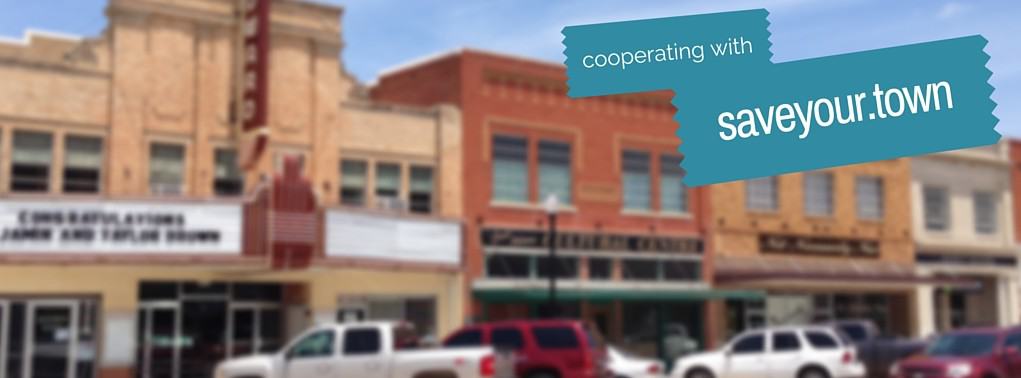
Has “Shop Local” been so overused that it has become garbage?
This first appeared in our weekly email newsletter, A Positive View of Rural.
Even though I love local business, I’m about ready to ban “shop local.”
Sounds crazy, doesn’t it? I mean, I’m something of a shop local champion. So why am I ready to get rid of “shop local”?
Because I’m afraid it has lost all its meaning. People have been beat over the head with “shop local” so much, that their heads hurt. They got the “shop local” part, but none of the bigger story made it through.
Here are two of my friends who recently shared very publicly why they didn’t shop local, and how local businesses brought it on themselves.
My friend James was trying to buy a coffee in a small town in the evening. The local coffee shop was closed. In fact, all the downtown businesses were closed. He ended up at McDonald’s. He wrote about it on Small Biz Survival: The Number One Complaint About Small Town Businesses.
Another friend, Chris stepped in to his local coffee shop, where he waited, without service and without attention for too long. And he left, probably for good, and went down the street to (you guessed it) McDonald’s.
““LOCAL” DOES NOT EQUAL “GOOD.”” Chris wrote about it later. “Local equals local….If you intend to be a local business, what will push people to choose you instead of the competition?”
Now that’s a good question! Chris went on to list a whole bunch of ways to give much better service than the chain or the big guys.
“If you can add value, you can trump price or availability as a local business,” he said.
See, Chris wants to care about local, but he doesn’t want to reward bad service.
And this is why I’m thinking of giving up on “shop local.” In its place, let’s start with improving our own businesses, and get much, much better about giving service and adding value. Then let’s work with our neighboring businesses to improve, too. Then when we have a good group of outstanding local businesses, let’s take that story to our customers. I’m betting they will listen to that much better than any generic “shop local” message.
If you want more of my help with your Shop Local project, take a look at the newly-updated Shop Local Campaigns for Small Town ebook.
- About the Author
- Latest by this Author
Becky started Small Biz Survival in 2006 to share rural business and community building stories and ideas with other small town business people. She and her husband have a small cattle ranch and are lifelong entrepreneurs. Becky is an international speaker on small business and rural topics.











I like how you question the whole Shop Local mantra while at the bottom of the post you have a link to:
Top Ten Reasons to Shop Local
Seems to be what you are saying is people need to think! If local can’t compete, it won’t succeed. Local businesses need to add value beyond what the national brands offer.
Leora, I’ve written a LOT about shop local in the past. The reasons on that list are still valid:
And I know that our local businesses, especially our locally-owned businesses, are the key to our prosperity. That’s why I want to help those businesses improve their service, quality and offerings so they can earn more business. If you have a poor quality business, and you market it more, you just help it go out of business faster. So improve the business first, then promote the heck out of it.
Same with shop local. Improve your local businesses first, then promote the heck out of shop local.
It is my belief that too many of the ‘shop local’ campaigns have an indirect, and some with a very direct, message of why you should help save a local business. Leora has it right when saying only a business that knows how to compete should, and will, continue to exist.
I am sorry that I had to purchase 4 CDs this month online. But when the local shop gave crappy service, it was time for my money to go elsewhere. I was spending discretionary money, and that experience should be fun for the customer. If you can’t make the shopping experience enjoyable, then the customer is going to go for less expensive so they have some discretionary money left to go have fun elsewhere.
Perhaps the phrase needs to be ‘shop local when the business understands why they exist’.
Tom, thanks for sharing your experience. It’s right in line with helping those businesses earn those local dollars.
I understand exactly what you’re saying about shopping local because I’ve experienced it. One weekend, I visited the small town where my parents live and we needed to get a tire fixed. We drove to 5 or 6 different local businesses and all of them had closed at noon on Saturday. We ended up going to Wal-Mart to get the tire fixed because it was the only place in town that was open on Saturday afternoon!
I own a biz in a community of 6,000+. Having the same challenges here. May I ask : How large is following?
Oops. I meant, How large is your blog’s membership?
I’ve got this all messed up. Above is correct email. Sorry.
Hi, Bill. Let’s see. About 2,000 people subscribe to Small Biz Survival through RSS and email. Is that what you were wanting to know?
Becky – Great post. I ran a Main Street operation in Baltimore for 2 years and was very close to many of the other local Main Street folks. But I come from an advertising/branding background, and I’ve always felt too many downtown districts focused too much on the “Shop Local” mantra–exactly for the reasons stated here. Too many local businesses and Main Streets believe people should “shop local” just because that business *is* local. And that’s just ridiculous.
At the end of the day, *all* consumers want to have the best shopping experience–whatever that means to them, personally. And sometimes–when the service is crappy, the prices are outrageous, the hours are bizarre, etc–people walk away from “local” businesses. But it’s not because they don’t support local businesses … it’s because those local businesses aren’t benefiting them.
No one–no matter how much of an activist–will continue to patronize a business that doesn’t benefit them solely because that business is local.
Local businesses and our business organizations need to recognize that. The businesses need to figure out if they’re benefiting their consumers and if so how to promote that benefit … and if they aren’t, they need to figure out what they’re doing wrong and how to fix it before they go out of businesses.
No faulty businesses with no consumer benefits should *ever* survive just because it’s “Local”.
John, thanks for sharing your experience. I’m particularly thinking about this, “all consumers want to have the best shopping experience–whatever that means to them, personally.” Local does play into that, but so do service, price, convenience and more.